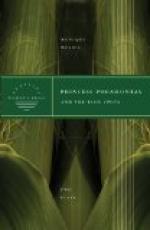Again, the location must be healthful, and quite easily defended, for the attack by the natives upon the colonists when they first landed at the cape they called Henry after the young Prince of Wales, had given them a taste of what they might have to expect. It was the rumor of this fight which had reached Opechanchanough at Kecoughtan.
At the prow of the Discovery stood a man who paid no attention to the disputes going on behind him. He was not tall, but was powerfully built, and even the sight of his back would have been sufficient to prove him a man accustomed to a life of action. It was not so easy, however, to guess at his age. His long beard and mustache hid his mouth, and there were deep lines from his nose downward that might have been marked by years. Yet his brow was high and wide and unfurrowed, and his hair was abundant and his eyebrows dark and high. An intelligent, eager countenance it was, of a man who had seen more of the world in his short twenty-eight years than any white-haired octogenarian of his native Lincolnshire. He held a spy glass and, standing by the rail, moved it slowly until he had pointed it in every direction. He had swept the river and both shores as far as his eye could reach and now it rested on an island some little distance above, near the right-hand bank of the newly named river.
A sailor, pushing through the crowd about the cabin door, approached the man at the prow.
“Captain Smith,” he said, “Captain Newport bids me say that the Council is about to be sworn in in the cabin and that he desires thy presence there.”
John Smith turned and walked slowly aft, wondering what would be decided in the next hour. Was he, who felt within himself an unusual power to organize and to command men, to be given this wonderful chance, such as never yet had come to an Englishman, to plant firmly in a new land the seed of a great colony? From his early youth his days had been devoted to adventure. He was of that race of Englishmen who first discovered how small were the confines of their little island and who sallied gaily forth to seek new worlds for their ambition and energy. Raleigh, Drake, Sir Martin Frobisher, Sir Humphry Gilbert, Sir Richard Grenville and John Smith were the scouts sent out by England’s genius to discover the pathways along which she was to send her sons. Bold, fearless, untiring, cruel often, at other times kind and firm, they went into new seas and lands, seeking a Northwest Passage, or to “singe the beard of the King of Spain,” or to find the legendary treasures of the New Indies—yet all of them were serving unconsciously the genius of their race in laying the foundations of new worlds. Perhaps of them all Smith saw most clearly the value of the settlement in Virginia, and just as clearly was he aware that the jealousies and avarice of many of his fellow colonists would threaten seriously its growth and indeed its very existence.




